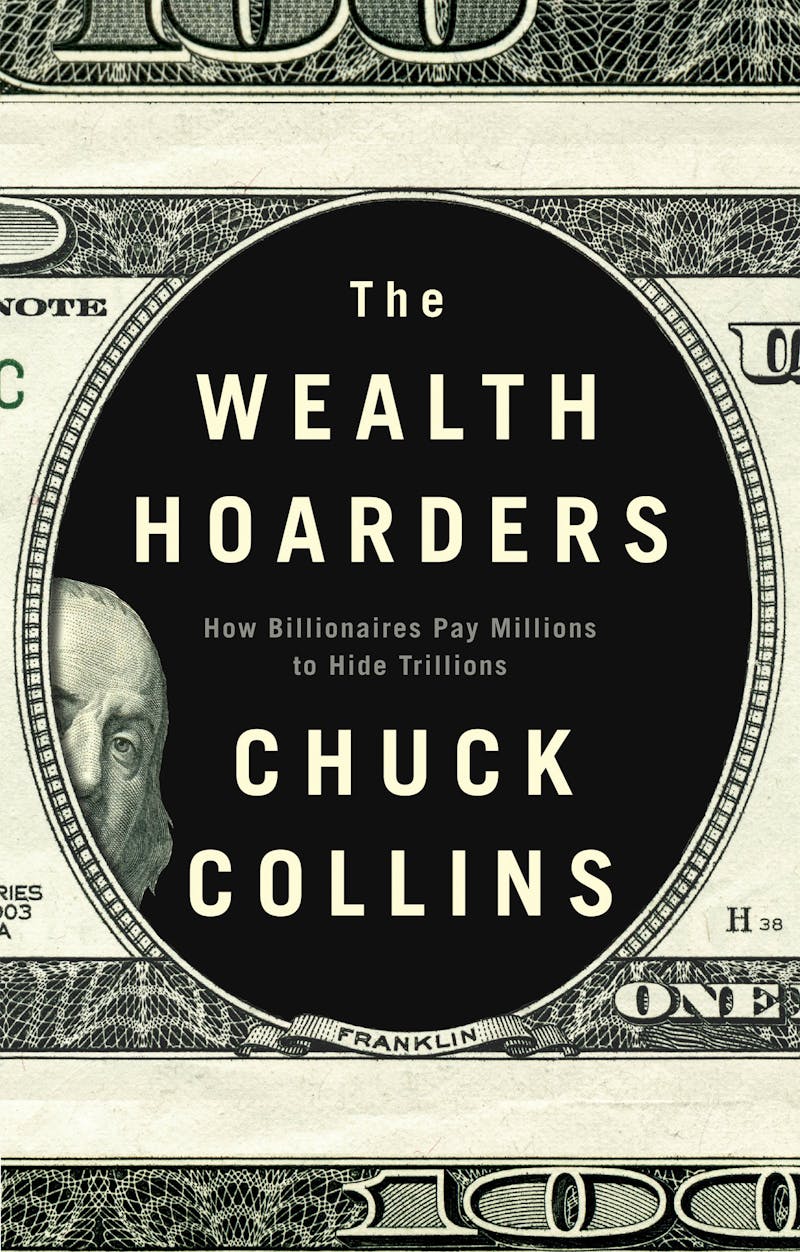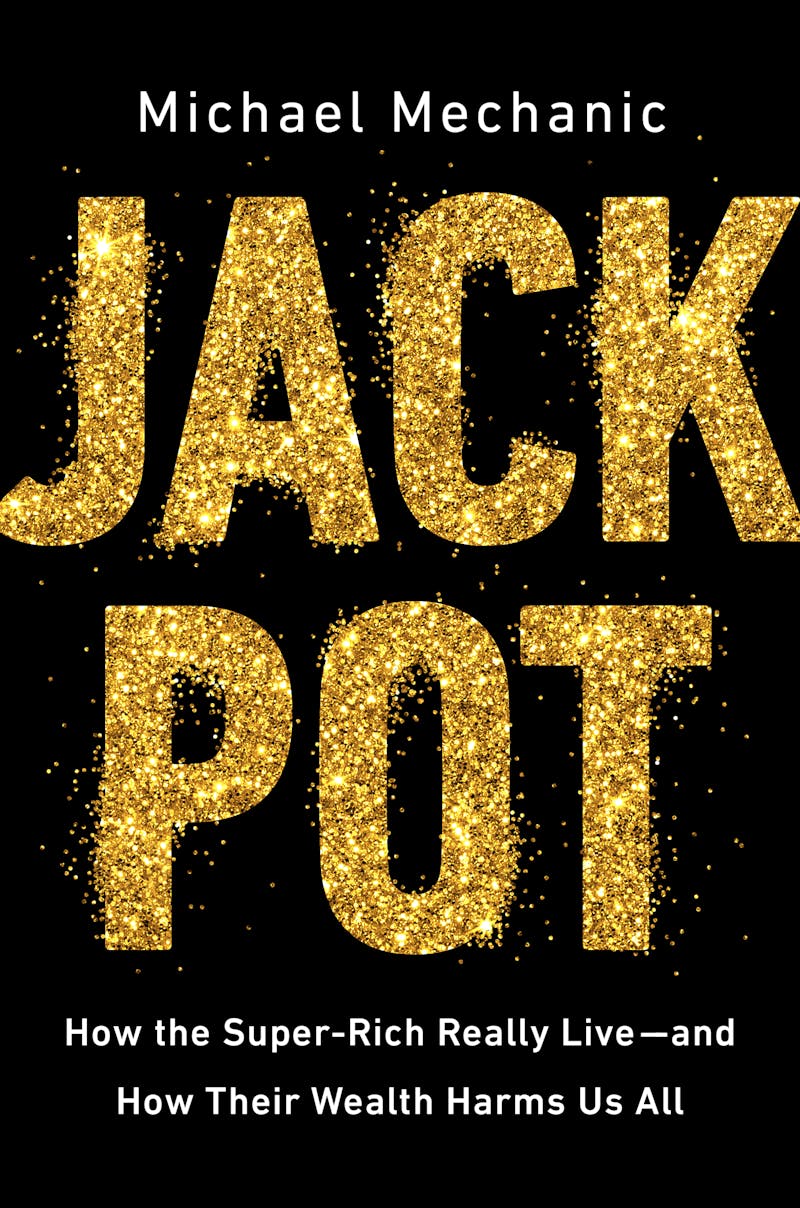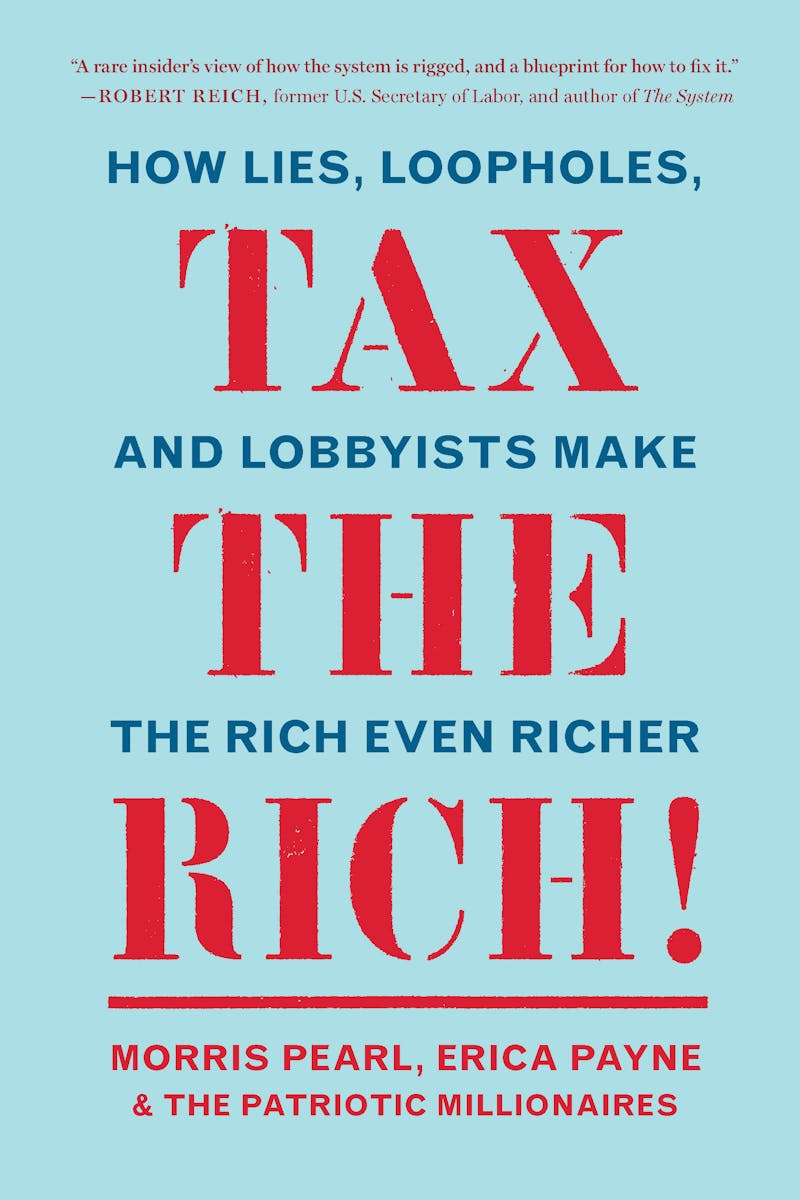It’s fairly easy by now to identify the problems that extreme wealth creates in a society: the way it corrupts politics, the way it sequesters resources among a small group of people, and the way it drives up housing prices, making life more expensive for all. It is more difficult to imagine how extreme wealth might harm the extremely wealthy, and why some of them might be willing to give up that privilege.


The stories of tragic lottery winners—those people who happen upon large sums (wealth of over, say, $10 million)—are, however, a good place to start. Take the saga of a man from West Virginia named Jack Whittaker, who, on Christmas Day in 2002, learned that he had won the largest Powerball to date, $315 million. At first, there was much celebration and a number of heartwarming television appearances (eight in all) with his wife and granddaughter. Whittaker owned a prosperous construction business, didn’t need much of the money for himself, and wanted to spread it around to others. After paying the taxes on his prize, he committed millions to local churches.

But the publicity caused a torrent of requests for help, and Whittaker had to hire a staff to sort through the mail, a task undertaken in daily 10-hour shifts. Anywhere Whittaker went in public, people would swarm him asking for money—sometimes, he said, 150 people at a time. Whittaker’s construction business became a homing beacon for litigation, and he estimated that he had dealt with over 400 legal claims in the first five years after he won the lottery. This, of course, required a phalanx of lawyers. He became increasingly friendless and isolated, often getting into fights with people in local bars. One night, he was drugged and robbed of $2,000 in cash. He wouldn’t be blamed for indulging in a bit of paranoia.
Whittaker showered most of his money on his family, primarily his 17-year-old granddaughter, Brandi Bragg. He bought her four new cars and gave her an allowance of $2,000 a week. She began to use drugs and attracted the attention of the area’s drug dealers. In and out of treatment, she was soon found dead, wrapped in a plastic sheet, just two years after Whittaker won the jackpot. Whittaker openly declared that he wished he had never claimed the prize. “I wish I’d torn that ticket up,” he said.
A fortune, as Whittaker’s case demonstrates, can be a burden, if not altogether a curse. It’s an idea that is a theme of Michael Mechanic’s new book, Jackpot, one of three new books that argue against extreme wealth by showing how damaging it is, even for the beneficiaries. Mechanic is a journalist, and his book reports on the lifestyles of the superrich; the two other books, Tax the Rich! by Erica Payne and Morris Pearl and The Wealth Hoarders by Chuck Collins, are written by the insiders, people who have possessed immense wealth themselves. These are not academic, forensic tracts on the rise of wealth inequality like The Triumph of Injustice, a 2019 book by economists Gabriel Zucman and Emmanuel Saez. Instead, these new books offer detailed portraits of the inner workings of wealth and the structures that protect it. If the authors can describe firsthand how troubling great wealth is, can they also tell us how to dismantle the system that created it?
Mechanic’s book is not about the lottery; it is about the lives of extremely wealthy people in America and the strange world that the fantastically rich live in. Still, many of his subjects come into money the same way lottery winners do: in a windfall, whether from an initial public offering or inheritance. Mechanic begins his book with the story of the employees of Netscape, who became fantastically rich in 1995 when the company went public. This was before extreme wealth in Silicon Valley was commonplace, and these Netscape employees were clearly unsure of what to do with their windfall. One engineer purchased enough Silly Putty to fill up a bathtub. Others bought luxury campers so that they could live in the parking lot. Many reported their previous friendships suffered, and they began to turn to one another for comfort in what they called their “shared trauma” of instant wealth.
Defining your spiritual worth in society becomes more complicated when you don’t need to work for a living. Mechanic finds that not having to work for a living is a lot like being underemployed and poor. “Extreme wealth,” he writes, “bears an odd resemblance to poverty in terms of the psychological malaise it inflicts.” A study from 2018, cited by Mechanic, suggests that after about $95,000 income per year, people stop noticing a difference in their quality of life. After they surpass a certain level, their reported happiness starts declining. Sympathy, of course, is almost impossible to muster, but it does suggest the potentially fragile mental state of the wealthy and the need for a specific upward limit of wealth.
Today, while wages for the rest of society stagnate, the number of extremely wealthy people grows. From 2016 to 2019, the number of ultrahigh net worth people, with assets over $30 million, increased by 29 percent, to 93,790. These people possess a growing share of society’s wealth, with the top 400 richest people owning more wealth than the bottom 60 percent of the U.S. population combined. With this rise, there has been a proliferation of ever more expensive products and assets for the extremely wealthy to buy. Mechanic spends a chapter cataloging this exhausting world of pricey inanities, including a $230 steak, $2,200 sushi dinner, $1,500 cocktail, $300 shot of cognac, $100,000 watch, $16,000 iPhone, $565 shoes that look dirty, $570 T-shirt, $1,000 tie, $45,000 suit, $2,000-a-night hotel room, and $2 million car. At some point, your eyes glaze over and you start wondering why they don’t just make a $6 billion car and get it over with. You begin to feel as someone who has been rich a long time must feel from time to time: numb to luxury.
But the real action is in the bigger-ticket assets, like the multiple houses, yachts, artworks, jets, and thoroughbred horses. Each in turn requires a staff that needs to be managed. A horse, for example, can be purchased (relatively) cheaply but needs constant maintenance. Each house demands at least one cleaning person, if not five, and a squadron of landscapers, pool boys, and other custodians who all need direction. The bigger the house, the bigger the staff, the more people you must manage. Or hire someone to manage. “Great wealth is a job,” Mechanic writes, “no matter what you do with it.”
Throughout Mechanic’s book, you notice that extremely wealthy people’s heaviest indulgence might be paranoia. Many travel with a security detail. There’s also a service that trains nannies in combat and surveillance and, among other things, encourages staff not to post about their employers’ luxury vacations, for fear of tracking. Mechanic meets a contractor who builds luxury safe rooms with “bomb-resistant doors, electromagnetic locks, communications gear, redundant power sources, and blast-proof Kevlar plating that can stop a barrage of AK-47 fire.” These safe rooms, he finds, are common, though if you are really wealthy, you might opt for a safe room within a safe room with a hidden gun port within a walk-in closet to return fire. “Some of the weaponry I’ve seen in people’s houses matched what I’ve seen in Iraq,” says the contractor. The extremely wealthy feel besieged from all sides. A private-equity titan tells Mechanic, “I’m starting to think more about income and equality. I’m thinking they could come and burn my house down. They could come for us with pitchforks.”
Mechanic introduces an anonymous character called Martha who has received an incredible inheritance from her mother, wants nothing to do with it, and finds that simply giving away the money is easier said than done. Her wealth must be an absolute secret from her friends. She’s a writer and worries no one would take her work seriously if they knew her net worth. She cannot tell her friends about her money or even help them out with their bills for fear of stoking resentment. Her wealth ruined her last marriage and makes her afraid to date again. “It’s practically a daily battle to put it down so that I can actually write my books,” she tells Mechanic. “I feel like I have a train coming at me. That’s how I feel about it.”
How did wealth get so obscenely concentrated that some of the beneficiaries are fretting about violent revolution and others have more than they could possibly want? It isn’t the natural order of things or the spoils of hard work, says Erica Payne of the Patriotic Millionaires in a new book called Tax the Rich! that she co-wrote with fellow Patriotic Millionaire Morris Pearl. No, wealth inequality and extreme wealth are by design. The mechanism for this design? The tax code.
The Patriotic Millionaires are a group of wealthy people who have made a splash in recent years in their calls for higher taxes. They formed in 2010, defining a millionaire as someone with over $1 million in income per year or $5 million in assets. Appalled when it appeared that President Obama was going to extend the Bush tax cuts, they got together to write a letter, asking him to tax them more. It didn’t work. Democrats extended the tax cuts for two years, after which, when the $3.4 trillion in cuts were set to finally expire, they were walked back to $600 billion in a bipartisan effort. With over 200 members, the Patriotic Millionaires are, it must be noted, a very small portion of the total number of people they consider wealthy (about 500,000). While there are high-profile members like Abigail Disney, an heir to the Disney fortune, most of the members are investors—Pearl is a former BlackRock executive—and philanthropists you’ve likely never heard of.
The extreme concentration of wealth, the millionaires point out (or admit), wasn’t inevitable. Payne writes that “a small group of very wealthy people spent a huge amount of money over a very long period of time to influence a political system to write tax laws to ensure that the economy would deliver most of its gains to them.” This system means that whichever political party is in power, boom or bust, recession or manic bubble, the extremely wealthy lock in their perpetual windfall. Showing how close the wealthy are to the political process, the Patriotic Millionaires attest to how easy it is for them to pick up the phone and talk directly with senators.
To understand how the tax code steers money to a small group, Payne stresses, we need to know that taxes are not primarily a tool to raise revenue for government spending—the federal government can and does spend without regard to tax collection. Taxes are a tool to constrain incomes, as well as set norms for behaviors, among other things. The way we tax different activities speaks to our priorities as a society. We tax tobacco, alcohol, and gambling, for example (“sin taxes,” as they’re called), but mostly don’t tax food. New Jersey assesses a higher property tax if you have a pool. Is there a strict econometric logic to this? No. Taxes exist at the crossroads of economics, politics, and ethics.
Currently, our tax code is designed to concentrate wealth among a tiny few by only lightly taxing the sources of wealth. The most prominent example is the capital gains tax, which, at rates that top out at 20 percent, is much lower than the income tax. Capital gains are the income that a person makes from investments. A practical example: In the state of New York, if you made $80,000 a year in income at your job, you would pay 26 percent of that in taxes, whereas if you sat around all year and made $80,000 in investment income, you’d pay nothing in taxes, because the government doesn’t tax the first $80,000 in investment income. After that amount, you’d only pay up to 20 percent in taxes, a savings that becomes the excess wealth. The wealthy hold much more of their wealth in investments, and this is why, as the economists Zucman and Saez have found, the poorest 10 percent of Americans pay 10 cents on the dollar in taxes, while the wealthiest pay 1 or 2. “Our elected officials may talk endlessly about the value of a hard day’s work and the nobility of labor,” Payne writes, “but our tax code is deliberately designed to reward capital income over labor income.” This is why someone like Martha can be showered with greater and greater wealth without even trying.
The second important way that our society helps the extremely wealthy stay extremely wealthy, Chuck Collins argues in his book The Wealth Hoarders, is the abuse of legal entities called trusts, which have two ruinous functions: They allow people to pass huge bundles of wealth on to their family, and they obscure the true ownership of that wealth, making thorough taxation hopeless. Trusts originated in England during the Crusades, to hold the assets of one person (called the settlor) by another person (the trustee) for the benefit of a third (the beneficiary). Knights traveling to the Middle East, thinking they might not return for years if they returned at all, would put their land in trusts while they were away until their children were old enough to take control.
Today, Collins explains, trusts are primarily designed to avoid the estate tax, a wealth tax intended to prevent the concentration of hereditary wealth. The estate tax generally ranges from 18 to 40 percent, which could be a massive amount of total wealth, even on the low end. Yet, over the last 40 years, it has grown increasingly avoidable and toothless. As all three books find, and as Gary Cohn, a Democrat and Trump’s director of the National Economic Council, commented in 2017, “only morons pay the estate tax.”
Practitioners of what Collins calls the Wealth Defense Industry—an armada of tax experts, lawyers, and accountants—exploit an array of loopholes (that they often lobby for) hidden in an increasingly complex set of tax laws surrounding trusts, in order to get their clients out of paying. Collins knows these experts well: He met many of them as an heir to the Oscar Mayer fortune, just before he defected from the moneyed class and horrified these experts by giving his whole fortune away. The Wealth Defense Industry is a field that, while hard to track, is growing. In 2003, 16,000 lawyers specialized in trusts and estates; last year, there were around 25,000.
A crucial tool is the grantor retained annuity trust (GRAT), a type of trust that just about every billionaire has used to launder their wealth to their children. It allows a person to stash stock in the trust for a certain amount of time and pass the upside to their children, tax-free. Mark Zuckerberg dumped 3.6 million pre-IPO shares of Facebook into the Mark Zuckerberg Annuity Trust, meaning that any children stand to acquire millions from it tax-free. Sheldon Adelson, the casino owner, transferred at least $7.9 billion to his heirs this way, avoiding $2.8 billion in gift taxes. Fred Trump passed on his wealth with a GRAT.
Surprisingly, the steep rise in trusts emanates primarily from South Dakota; the state has led the way in undermining the estate tax by radically liberalizing trust law. Over the last 40 years, South Dakota augmented numerous rules around trusts, making them more useful for passing money between generations and obscuring ownership. The state revoked what is commonly known as the “rule against perpetuities,” a law that generally requires trusts to be dissolved once a person dies; this allows trusts to grow and compound over generations, worsening wealth inequality significantly.
Trusts also make wealth so opaque that it can’t be taxed. South Dakota allows trust accounts to be anonymous, and the Wealth Defense Industry can cover clients’ tracks by running assets through a couple of trusts that are owned by a variety of shell corporations owned by other shell corporations in Delaware (a state that allows corporate owners to remain anonymous). After this process, there’s almost no way to know how much wealth a person has. Collins gives the example of Robert Oesterlund and Sarah Pursglove, who owned “forty internet companies, a Cessna jet, a $30-million yacht, a $10-million mansion in the Bahamas, a $5.7-million mansion in Boca Raton, and a $23-million penthouse at the Four Seasons Toronto.” Yet, finding their names on any paperwork was difficult. While it is not legal to avoid taxes you owe (that’s called tax evasion), it is legal in South Dakota and Delaware to conceal ownership, thus making it impossible to accurately tax wealth.
All this legalized secrecy has made the United States, as of 2020, one of the largest tax havens in the world, second only to the Cayman Islands and surpassing Switzerland. Tax avoidance and the wealth concentration it promotes aren’t exotic, foreign problems of lawlessness. On the contrary, much of this is domestic and almost all of this is legal.
The solution may seem simple: Raise taxes! But this turns out, for many reasons, to be a task that is neither easy, nor straightforward, nor sufficient. The first obstacle is that there may not be a political party willing to do it on a significant scale. The Patriotic Millionaires find that both Republicans and Democrats, since at least the Reagan era, have perverted the tax code and driven more income to the wealthy. “When it comes to taxes,” they write, “a pox on both their houses is probably the most reasonable position to take.” Taxing the rich in any serious way is not currently an option that voters can choose at the ballot box, though the Biden administration is planning to increase a host of taxes that would affect the wealthy more than any other tax hike in almost 30 years.
Another obstacle to higher taxes is the sheer complexity of the current system of wealth defense, with its opacity and its 1,000 tiny loopholes. After reading Collins’s book, you get the impression that even if taxes were raised sky high, the wealthy are so adept at avoiding them, it is not clear whether a wealth tax would work at all. It doesn’t matter how high taxes are raised, if the money to be taxed is effectively hidden. In our hyper-federalized system based on some degree of state’s rights, how do we get South Dakota and Delaware—not to mention the entire Wealth Defense Industry—to stop abetting tax evasion?
But here’s where things get really complicated: Even if a wealth tax were implemented, it would address only one part of the problem. Measures to constrain wealth in one group also need to be complemented by direct federal spending on housing, education, public transportation, and childcare, among other things, to create wealth elsewhere in order to reduce inequality. To achieve this would take more than high taxes for the rich and low taxes for the poor. A higher minimum wage would create more wealth for millions of Americans; more affordable housing would allow them to keep more of their wealth.
Furthermore, if we continue to buy the specious idea that taxes “pay for” government spending, we’ll be buying into the idea that we need to perpetuate extreme wealth in order to fund services—just as a carbon tax to fund, say, free college education requires the continuous extraction of carbon. The larger question is: How does such vast wealth accumulate in the first place? Discussions of inequality rarely talk about the expansive patent laws that drive profits for tech companies and pharmaceutical firms; or about how Tesla’s profits were underwritten by a government subsidy for consumers buying their cars; or about lucrative military contracts that prop up weapons manufacturers and aerospace corporations. All are mechanisms through which government action creates private fortunes. Changes to legislation in these areas could prevent inequality building up in the first place, instead of trying to fix it after the fact through taxation. For any of these plans to work, it’s important to remember that taxation is a limited tool that’s prone to abuse. We can’t over-rely on it to distribute wealth.
Extreme wealth is so deeply entrenched that policy proposals on their own might not be enough. A million small fixes, Payne argues, will not help us if we do not have a vision of the society we want. A wealth tax, without a shift in attitudes away from the veneration of wealth, will likely fail, and inequality will eventually rebound, as it did after America’s high-tax interlude following World War II. A wealth tax is a technical fix for an ideological problem. The objections to wealth concentration by wealthy people help to diminish the underlying, largely uncontested idea that we need the wealthy, and that they need their wealth.
Indeed, we live in a bizarre world: Our society so efficiently steers ever more wealth to the already wealthy and does so with such gusto that some beneficiaries of this system don’t even want it, and others have become, like Jack Whittaker, isolated and increasingly paranoid. We’ve created a class of highly fearful, politically dominant, and loss-averse billionaires. Polling and research show, unsurprisingly, that this is not the kind of society most people hope for or even support. One study found that when most people were asked what portion of the society’s wealth the top 20 percent should own, they answered that they should own about 30 percent, not knowing that that same group owned about 80.
Extreme wealth is so extreme it is almost beyond comprehension. And while those lucky winners of our tax code likely won’t tear up their own tickets, it might be possible to create a system that doesn’t issue them the ticket in the first place.




